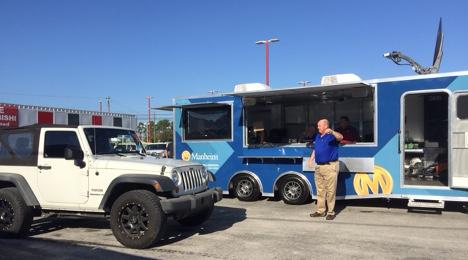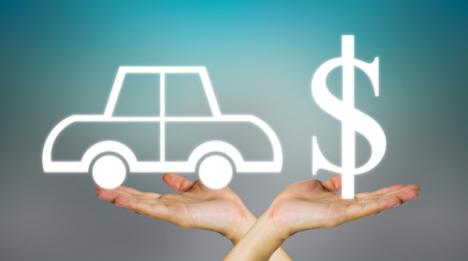Helion Automotive Technologies has a new data security warning for auto dealerships because in recent weeks spear phishing hackers have been busy planting malware inside of social media posts designed to lure employees of organizations to click on the post.
Dealership employees are ideal targets for spear phishers looking to grab Personally Identifiable Information (PII) and bank account information, according to Helion.
"This is the same spear phishing scheme that hackers have been using successfully in targeted email messages for several years now," Helion president and chief executive officer Erik Nachbahr said in a news release. "The problem is that although most employees have been told and know not to click on emails from people they don't know, they don't think twice when it comes to clicking on a message or offer in their Facebook feed. They are more trusting in a social media environment."
If employees take the bait of hackers and click on infected links, malware can be downloaded onto the employee's computer compromising the entire organization's network, the information technology solutions for auto dealers said.
Helion recently conducted a phishing test at an auto dealership by sending emails to 125 employees where three employees took the bait. When prompted by the website the email drove them to, they entered both their usernames and passwords.
If the attack were in fact real, the consequences could cost a dealership thousands, Helion said.
"That test was a good sample that revealed auto dealerships are very vulnerable to this type of attack and need to do a better job at educating their employees," Nachbahr said.
Nachbahr’s tips for preventing a spear phishing attack:
- Instruct employees to never click on links in social media posts and messages from their computers or personal devices while at work
- Require employees to change their network login passwords every 90 days
- Encourage employees to keep social media profiles private and don't accept friend or connection requests from people they don't know
- If employees receive a phone call, email message or social media message from a banking institution, vendor or other entity that asks for personal information, do not give this information verbally or via email, but contact the institution directly
- Get cyber liability insurance, which covers costs associated with a data security breach and loss of data
- Regularly apply software updates to Microsoft Windows, Internet Explorer and all software applications on every PC
KAR Auction Services announced that four of its leaders from KAR and its ADESA and Automotive Finance Corp. business units will be featured speakers and panelists at the National Independent Auto Dealers Association Convention & Expo this week in Las Vegas.
The vehicle remarketing and technology solutions provider’s speakers include KAR chief economist Tom Kontos, AFC chief operating officer Joe Keadle, ADESA director of dealer consulting services Doug Hadden and AFC vice president of operations Johnny Shroyer.
KAR said Kontos and Keadle plan to discuss the current and anticipated economic strengths, weaknesses, opportunities and threats related to independent dealers on Thursday from 8:30 a.m. to 9:30 a.m. (PDT).
On Tuesday, Hadden will deliver a presentation on higher net profits that examines different ways to navigate through lower margins while achieving higher net profits and Shroyer will join other industry experts on the Floorplanning Tips for the Independent Dealer panel.
Both of those are on Tuesday from 4:15 p.m.to 5:00 p.m. (PDT).
For more information about the convention and this year’s speakers, visit www.niada.com.
SoCal Penske Dealer Group announced it acquired the Fuller Ford, Fuller Honda, Fuller Kia and Fuller Collision Center in Chula Vista, Calif., further expanding its footprint in the Southern California market.
The former Fuller locations have been rebranded as Penske Ford Chula Vista, Penske Honda Chula Vista, Penske Kia Chula Vista and Penske Collision Center Chula Vista.
“Closing this purchase represents a significant milestone for SoCal Penske Dealer Group and gives us deeper roots in the San Diego retail market,” the group’s chief executive officer, Roger Penske Jr., said in a new release. “Fuller Motors is one of the largest employers in the City of Chula Vista.
“A great deal of effort from both sides went into ensuring a smooth transition for the Fuller employees. We are thrilled to now count their employees, guests and neighbors among our friends and family and look forward to developing strong ties to the local community.”
SoCal Penske now has a total of 14 dealerships in Southern California since acquiring the Fuller stores.
Galpin opens exclusive Kia dealership in Southern California
Galpin Motors’ latest franchise, Galpin Kia in North Hills, Calif., is just adjacent to Galpin’s main campus on Roscoe Boulevard and finished last month as the No. 8 Kia dealer in the country.
The new store is the exclusive Kia dealership in San Fernando Valley County and the 12th franchise to join Galpin’s collection of brands, which includes Ford, Lincoln, Mazda, Aston Martin, Honda, Subaru, Volkswagen, Lotus, Volvo, Jaguar and Spyker.
Galpin Kia officially opened in October and its inventory is made up of Kia’s full line of cars and SUVs.
“We couldn’t be more excited about the opening of our Kia dealership,” Galpin Motors president and chief operating officer Beau Boeckmann said in a news release announcing the opening. “I just returned from Seoul, Korea, where I was able to see the amazing Kia factory, its beautiful cars and wonderful designs.
“The automaker has been incredibly successful at building a line of stylish, quality cars that are still attainable for consumers. Having a Korean family, I feel especially honored to add a Korean brand into our Galpin family.”
In addition to its collection of franchises, Galpin Motors also operates its well-known customizing shop, Galpin Auto Sports (GAS). GAS is the former home to MTV’s Pimp My Ride and a popular shop for a number of Hollywood’s elite, according to the group.
As the mobile auction format continues to attract more dealers across the country, companies within the industry are continuing to push the wholesale auction experience and communicate the benefits that many used-car managers praise.
“We’re averaging well over 60 mobile auctions per month around the country right now, and that’s a huge increase from just barely over 20 a year and a half ago,” said Manheim’s Randy Beil. “Our core product is what we call true mobile; that is where we bring either a trailer or a bus fully equipped to handle an auction, simulcast, and an auctioneer.”
Beil, who is vice president of local/mobile at Manheim, said a large part of what he and his team does is to grow Manheim into different markets across the country where the company might not already have a presence.
“What we’re really trying to do is create a model to get into these markets, partner with dealers we already do business with and try to get more of their low-end business,” Beil said. “That’s exactly what we’ve done largely in our growth in the past year and a half.”
He said Manheim has been able to get in many cities through existing partnerships with dealer groups.
The company’s mobile sales are launched by two different platforms it refers to as true mobile and mini mobile. True mobile is its largest and core product.
“You get 100 percent of what you see in the auction but you bring it to the dealership, so we bring the auction to the dealership, and that’s what we call true mobile because that’s exactly the core of our product,” Beil said.
“We bring that auction to the dealership and we largely sell their trade-ins from that store or four or five stores at that auction. Some locations host sales once a week, sometimes we do it every other week, sometimes we do it once a month. It all depends on the volume that dealership has.”
Manheim has been expanding its mini mobile product over the past six months, according to Beil.
What differentiates them from a true mobile is it’s much more of a permanent auction, such as a two, three or four-lane facility.
“This is a basically a full on auction as far as a dealer is concerned, often it’s a one, two, three-lane auction that we get into a market and we open up a small auction and it’s a stand-alone auction for all practical purposes, but internally from our standpoint it’s kind of like a satellite auction because its’s still managed by a parent auction,” he said.
“We rely on the parent auction’s staff to help support the functions of the satellite auction.”
Of all the cars Manheim sells at its mini locations, all of the revenue and all of the expenses flow up to that parent auction.
“We brand them and we market them, we advertise them, it’s a stand-alone auction that looks a like just an others,” Beil said.
Mini mobile auctions bring in about 40 to 50 different sellers to each sale, while true mobile is usually one consigner, according to Beil.
The fundamentals of mobile
Digital technology is a fundamental resource mobile actions depend on, says Ryan Rickey, general manager of XLerate Group’s Your Auction Mobile sales.
“Traditional brick-and-mortar, where dealers go in and can check out cars week-in and week-out, sometimes these mobile auctions have a greater travel time. Rickey said. “We depend on the internet and our marketing tools via the internet so people can check out extensive pictures, pre-sale inspections — things of that nature, just to give them the confidence to bid online and or show up in person.”
Your Auction Mobile’s sales allow dealers managers to remain in their stores and focus on retail as opposed to running the “gauntlet of auctions,” he said.
“In today’s climate, post the recession, secondary lending became more aggressive and dealers started holding on to that c-paper. Having the auction onsite gives you a chance to potentially retail some of those vehicles you'd otherwise be wholesaling weekly,” Rickey said.
Taking it to a higher level
Auctions In Motion (AIM) started in 2006, as a completely mobile sale. It was purchased by what is now known as XLerate in in 2012.
“We literally went to the dealers’ lots and we would set up our pop-up tent along with a couple of trailers that would support the auction,” said George Pero, AIM founder and general manager at Corry Auto Dealers Exchange, an XLerate auction.
“The business gained momentum,” Pero continued. “First it was a bi-weekly sale and then it was a weekly sale and then it gained so much attention and critical mass business that we thought that the next step in progressing the expansion and growth of the business was to get a single free-standing facility where we would run a one-lane auction.”
When asked about any challenges associated with mobile sells, Pero said: “Challenges really aren’t that many or significant; I would say running out of space when you have a lot of consignment.
“For consignment, for a one-lane mobile sale is 150 to 200 units, they become so popular that we run out of space.”
Challenges remain
The challenges associated with mobile sales are similar to those of any auction, according to Jane Morgan, who is president of specialty auction divisions at ADESA and oversees mobile auction offerings and helps in geographic expansions.
“Educating dealers on how mobile sales work, why they should try mobile sales, and how mobile sales can benefit their business may be considered a challenge,” Morgan said.
Space may be a challenge, depending on the size of a dealer’s lot or the type of inventory, like if it is a mobile auction for heavy-duty trucks, for example.
Mobile auctions entails working with the seller to select their inventory in advance so it’s competitive in the marketplace, Morgan explained
She said selecting inventory far enough in advance is important to allow time to best match the right buyer to the right product.
Rickey added that a challenge he recognizes is larger competitors within the industry. “As an auction company, you see groups such as the larger groups in the industry — AutoNations, CarMaxes, they’re figuring out ways to do it themselves,” he said.
“The margins I think, are getting skinnier,” Rickey went on to say. “Profitability has to change, we just need to be aggressive and provide a service above and beyond our competition.”
While differing on how first-quarter activity unfolded, both Kerrigan Advisors and Haig Partners shared upbeat assessments of dealership buying and selling activity for the rest of 2017 as each used the adjective, "robust."
First, at Kerrigan Advisors, the firm reported that the action of dealerships changing hands “remains robust” for Q1 in spite of slowing vehicle sales and a slight dip in Blue Sky Values. According to The Blue Sky Report, a Kerrigan Quarterly, any negative headwinds are being offset by high dealership real estate prices.
Outpaced by the private companies in acquisition activity, Kerrigan Advisors indicated that publicly traded dealer groups are directing their focus to non-U.S. acquisitions. According to the report, macro-economic conditions, which offer opportunities for both optimism and pessimism, are contributing to a high level of activity in the buy/sell market, which is expected to continue throughout the year.
Kerrigan Advisors managing director Erin Kerrigan said, “2017’s buy/sell market is fueled by diverging viewpoints from conservative sellers and ambitious buyers — and is influenced by consistently high real estate valuations. Those confident in the long-term health of auto retail continue to seek acquisitions and investments.
“By contrast, the pessimists, and those who are generationally ready to go out on a high note, are increasingly choosing to exit the market, selling their dealerships at today’s high prices and avoiding a potential downturn. All of which contributes to a very active and robust buy/sell market,” Kerrigan continued in a news release.
Other key findings from Kerrigan Advisors’ Q1 2017 report include:
—Dealership real estate prices and rents rose considerably on a quarter over quarter basis. Real estate, for most dealers, is their highest value asset, far exceeding franchise value.
—Transaction activity increased slightly in the first quarter of 2017, exceeding 2015 and 2016’s high pace with 60 dealership buy/sell transactions completed in the quarter.
—2017 is tracking towards 240 transactions for the year.
—The number of multi-dealership transactions declined from 19 to 11. Kerrigan Advisors expects the pace of multi-dealership transactions to increase considerably as the year progresses.
—Public retailers’ acquisition spending decreased 12 percent. Since January, The Kerrigan Index, which includes the seven public auto retailers, is down 9.6 percent to 492, underperforming the S&P 500.
—The private sector acquired 93 percent of the franchises sold in the first quarter of 2017.
—Domestics continued to grow their share of the buy/sell market — a trend driven by the growing market share of trucks and SUVs.
—Import luxury franchises’ share of the buy/sell market declined by 45 percent.
The report also identified the following three market trends, which Kerrigan Advisors expects to affect the buy/sell market in 2017 and beyond. That group includes:
—Dealership profit plateau shifts buyer’s focus to current earnings
—OEMs’ buy/sell approval processes differ significantly
—Multiple arbitrage for dealership business lines continues
“Overall, we continue to expect 2017 to be a very active year for buy/sells with private buyers, new entrants and certain public buyers eager to put their capital to work. An increasing number of sellers are coming to market motivated by current prices and a strong desire to capitalize on today’s buy/sell activity,” Kerrigan said.
The view from Haig Partners
Meanwhile, Haig Partners reported that the number of dealerships sold in the U.S. declined 29 percent from 113 rooftops in Q1 2016 to 80 rooftops in Q1 2017, according to data published in the Q1 2017 edition of The Haig Report.
The firm explained this decline may have been partly because of the uncertainty caused by the presidential election in the fall of 2016. Haig Partners indicated buyers were uncertain if Congress would pass tariffs that would raise the costs of most autos sold in the U.S., or if taxes would be cut, thereby leaving more proceeds for sellers.
The report goes on to mention buyers are also increasingly concerned about future profits at dealerships so they are proceeding cautiously. And some sellers have not yet adjusted to new market conditions and may be asking too much for their dealerships.
Continuing the trend from 2016, Haig Partners noted demand for dealerships shifted from luxury and import brands to domestic brands that are heavier in trucks and SUVs. Purchases of domestic dealerships comprised 49 percent of total purchases in Q1, up from 43 percent in 2016.
Purchases of luxury dealerships were just 14 percent in Q1, down from 22 percent in 2016.
Haig Partners’ franchise blue sky multiples were unchanged in Q1.
Other key findings from the Q1 2017 Haig Report include:
—Macroeconomic indicators such as GDP, interest rates, employment, number of miles driven and consumer sentiment remain highly favorable for dealers.
—Other trends such as used car pricing, incentive spending by the OEMs, and rising inventories are growing less favorable to dealers.
—Retail sales are flat for the first four months of the year, although total sales, including fleet, fell by 2.4 percent.
—Declines in new and used gross profits per vehicle are being offset by gains in F&I and fixed operations.
—Sales and gross profits continue to increase at dealerships, but expenses are rising faster.
—Average profits per dealership fell 8.5 percent in Q1 2017 from Q1 2016. The average dealership pre-tax profit over the last 12 months was $1.437 million.
—Average estimated blue sky value per dealership dipped 2 percent from the end of 2016 to $6.92 million.
—Public auto retailers are spending more of their capital outside of core U.S. franchised vehicle dealerships, including stand-alone used car stores, international acquisitions and collision centers.
—Private equity firms and family offices continue to make substantial investments in auto retail.
Haig Partners pointed out that President Trump’s proposed plan to tax pass through entities like most dealerships would increase the amount of after tax income to many dealers by an estimated 24 percent to 35 percent, thereby raising the value of dealerships.
If passed, the firm said dealership values should remain stable or rise, even if pre-tax profits continue to drift lower.
“Despite the sharp dip in the first quarter, we expect dealership sales for the rest of 2017 to be robust,” Haig Partners president Alan Haig said. “There are many buyers, financing is still readily available, and more sellers are realizing that if they want to sell their dealerships before the next recession they will likely need to accept today's offer since tomorrow's offer could be lower.”
Haig Partners is seeing these conditions in its current engagements that include domestic, import and luxury dealerships that range from Florida to New York to California. The value of the transactions they have closed over the past two and a half years is approximately $900 million, including two of the largest transactions of 2016, so they have unique insights into current market conditions and how they impact dealership values.
More details
The Blue Sky Report, a Kerrigan Quarterly, is published four times a year and includes Kerrigan Advisors’ signature blue sky charts, multiples and analysis for each franchise in the luxury and non-luxury segments. The multiples are based on Kerrigan Advisors’ view of franchise values in the current buy/sell market and can be applied to adjusted pre-tax dealership earnings to estimate blue sky value. To download the report, click here.
The Haig Report is published each quarter and is a valued source of information to many in the auto industry who look to it for its comprehensive data, analyses and opinions about the auto retail industry. Included in each edition are Haig Partners' blue sky multiples that serve as a gauge for franchise values. To download the report, click here.
Auto/Mate Dealership Systems has fully integrated its dealership management system with Dashboard Dealership Enterprises to satisfy the current and emerging needs of its customers, the company announced on Wednesday.
Dashboard Dealership Enterprises develops dealership management reporting products and related services such as Executive Eye, the company’s flagship product.
"Managers at every level in automotive retail have more important things to do than spend time compiling data into reports, which quickly become inaccurate and don't tell the story behind the numbers," Auto/Mate president and chief executive officer Mike Esposito said in a news release. "Analytics and business intelligence software allow managers to drill down and identify why problems are occurring, so they can take immediate and appropriate action."
Dealerships using both Auto/Mate's DMS and Dashboard's reporting solutions can now take part in seamless data exchange and real-time updates across the two systems, according to Auto/Mate.
"Our mission is to exceed customer expectations for services, quality, speed of implementation, ease of use and support," Dashboard Dealership Enterprises chief executive officer Josh Blick said. "The Open/Mate integration process with Auto/Mate was painless and we are thrilled that more auto dealers now have an enterprise option to analytics and business intelligence."
Last week, CDK Global announced that it had signed a deal to acquire Auto/Mate.
CDK said in a news release it will integrate the Auto/Mate DMS into its product offering.
Each of the company’s boards has approved the deal, which is subject to customary closing requirements and regulatory approval. The deal, whose terms were not disclosed, should close this summer, the companies said.
Used-car buyers who shop online spend 62 percent of the car-buying process there: online.
That's according to Cox Automotive’s latest Car Buyer Journey Study, which examines consumers’ car-shopping behavior during the car buying process and how they use their time.
Cox Automotive found that during the chunk of time car buyers spend online, they research and shop across multiple devices, creating multiple marketing opportunities for dealers, according to the company.
A total of 53 percent of all respondents who shop online use multiple devices when shopping, such as both desktop and laptop computers, smartphones and tablets.
Eighteen percent strictly used mobile, according to the study.
Among those who go online, a breakdown on their usage on each device:
Desktop/Laptop: 79%
Smartphone: 56%
Tablet: 32%
Again, car shopping on multiple devices means multiple marketing opportunities for dealers, Cox Automotive said.
Dealers have an opportunity to create unique ways to communicate a consistent overall message with content specifically designed for each device that consumers use, according to the company.
Car shoppers are getting introduced to the dealership before they actually go to the dealership, Cox Automotive's Scott Hernalsteen said in a phone interview with Auto Remarketing.
“After they’ve done all their research online, they’ve made a pretty solid decision,” said Hernalsteen, who is Cox Automotive Media's senior director of research and market intelligence. “So even though they’ve entered the process undecided, by the time they get done with their online work they have a really strong idea of what they’re going to purchase — three-quarters of the time they do purchase from the dealership what they were intending to purchase.”
The study suggests that marketers maintain an integrated marketing strategy because third-party sites are the most-used site of any online resource.
Used-car shoppers spent 65 percent of their total amount of time online visiting third-party sites, while they spent only 12 percent on dealership sites.
“The third party sites are doing a good job delivering the information that they need,” Hernalsteen said. “While the numbers are lower for dealer and OEM sites, they’re still incredibly important to the process.”
Here is how used-car shoppers are spending their time online:
Third-party sites: 65%
Dealership sites: 12%
OEM sites: 6%
Search: 10%
Other: 7%
Cox Automotive commissioned the 2017 Car Buyer Journey Study through IHS Automotive and surveyed a total of 2,175 car buyers who purchased a vehicle within a year prior to August 2016.
An on-demand, live video platform developed by Los Angeles-based startup DropIn, gives dealership product specialists a tool that brings customers to car lots and showroom floors — without the shopper having to leave home.
“Nobody wants to come down to the dealership and be sitting in the chair and feel that high pressure anymore — those days are over,” DropIn chief executive officer Louis Ziskin said in a phone interview with Auto Remarketing.
This month, DropIn began onboarding new dealer clients following the closing of its product’s pilot program, which launched in December.
“Customers shop about 26 dealer websites before they engage with the tools that are on any of those websites, such as text, live chat help, lead forms, contact forms and phone calls,” Ziskin said. “They do their shopping, they’re pretty well-informed. But while they don’t want to talk to a salesman or engage with any of the tools there, they do on many occasions want to see if the car is actually there — they might want to see the car.”
Additionally, DropIn has added a CRM linking tool to its product. “For known customers where anonymity is not the case any longer, they can either send a text or an email with a link,” Ziskin said. “That video call can then can be initiated from an email, from Instagram, from Craigslist — from anywhere that product specialist wants to post it.”
If a call is missed, the CRM will notify the product specialist to reestablish contact with the customer.
Ziskin said an added benefit of adopting DropIn is dealers can also use the product within their service departments.
“Car dealers have always had the problem of ‘how do I give the customer a service walk-around, I’m not allowed to have them in the shop. My insurance doesn’t allow it, I just simply can’t have them there,’” Ziskin explained. “Now, the service specialist is able to put that link and attach it to the estimate and tell the person, ‘If you want a live service explanation, click here.’”
When the customer clicks the link, the video call is initiated and goes right back to that service specialist who can give the customer a walk-around in the shop that has no liability because the customer is not physically in the shop.
“You’re able to explain, ‘You need brakes and this is why, you need a new fan belt and this is why, you need new tires and this is why.’ The customer can now, in real-time, say, ‘Well, can my tires last another couple hundred miles, do I really need to really replace this now,’” he said.
When a customer receives just an estimate and maybe a picture, many of their questions don’t get answered. “So the estimate absorption rates are about 50 percent,” Ziskin said.
Dealers who have piloted DropIn within their service departments have self-reported a 25 percent higher estimate absorption, according to Ziskin.
“The closing rates are self-reported by the dealers themselves; the only thing we know is that there was a video call, and we know if they made an appointment during the call or if the lead form was filled out after the call, but we don’t know whether that converted to a sale,” Ziskin added.
“Our numbers are reported by the dealerships themselves as far as conversion to sale. They obviously have an incentive to downplay those numbers because they want our product cheaper and they’re still reporting anywhere from 20 to 30 percent closing,” he said.
Frontier Car Group, a new global company that builds and runs marketplaces for used cars in five countries, recently announced the closing of a $22 million investment made by a portfolio of global investors led by Balderton Capital.
With operations in Chile, Mexico, Nigeria, Pakistan and Turkey, the group said it will put the funds toward growing the emerging markets within each country.
"Frontier Car Group is an exciting company with huge potential and we are delighted to lead an investment in this company," Balderton Capital general partner Daniel Waterhouse said in a news release. "The co-founders have a clear vision for the future of automotive sales and are leading a Berlin-based team who have developed a technical solution and operational model that allows the company to scale effectively at great speed. The fact that they are already live in five continents is a testament to their diligence and determination."
EchoVC+, TPG/Satya, NEA and Partech Ventures also partnered with Balderton Capital in the investment round. Waterhouse and Eghosa Omoigui of EchoVC+ have assumed seats on the FCG board of directors.
FCG's current businesses include VendeNosTuAuto of Chile, VendeTuAuto of Mexico, Cars45 of Nigeria, CarFirst of Pakistan and Ototrink of Turkey.
Founded last year, the global company has grown to have 200 employees around the world, including operations in Berlin, home of its technical, financial and operational headquarters.
"The automotive sales sector is fundamentally broken in top tier emerging markets around the world. Despite massive consumer demand, there is no good scalable way for people to sell their used cars efficiently for a fair price," FCG co-founder and chief executive officer Sujay Tyle said. "Our vision is to reinvent how the used automotive sales sector works in global emerging markets through technology and infrastructure creation."
Tyle, along with Peter Lindholm and Andre Kussmann, launched FCG in September.
Before launching the group, Tyle co-founded Hired.com and served as its chief operations officer, Lindholm was an investment manager at Millicom, and Kussmann was director of engineering at Auto1 in Berlin.
Since adding Kelley Blue Book to its list of data providers, PERQ said the addition has increased the number of trade-in leads generated by PERQ’s FATWIN Web Engagement platform for its dealer customers by up to 300 percent.
The integration of Kelley Blue Book’s data with FATWIN provides online visitors both increased confidence in the valuations of their used vehicles and a better online experience, PERQ said.
“We’re excited to work with PERQ and further extend our market-reflective Blue Book Values,” said Damon Bennett, senior director of syndication for Kelley Blue Book. “Given that determining whether pricing is fair is among the biggest pain points when transacting, Kelley Blue Book is providing consumers with the confidence of how much to expect for their car.”
Initial results have shown that combining Kelley Blue Book data with FATWIN’s trade appraisal is drawing more online visitors and yielding higher conversion.
“Dealerships are, on average, experiencing a 3-time increase in trade-in leads, 5 times the volume of trade-in sales and a 9.2 percent higher average gross profit per unit sold,” PERQ said.
There are more than 300 dealership websites currently utilizing PERQ’s FATWIN Web Engagement solution, according to the company.
“The consumer experience is of paramount importance to engaging online visitors and converting leads into dealership sales,” PERQ executive vice president of product Stephanie Ragozzino said. “By combining Kelley Blue Book’s valuation data with PERQ’s uniquely intuitive interactive online experience, dealerships have an even more powerful opportunity to engage more visitors via our trade-in tool and turn more of those leads into car sales.”
For more details about FATWIN’s use of Kelley Blue Book’s data, click here.











